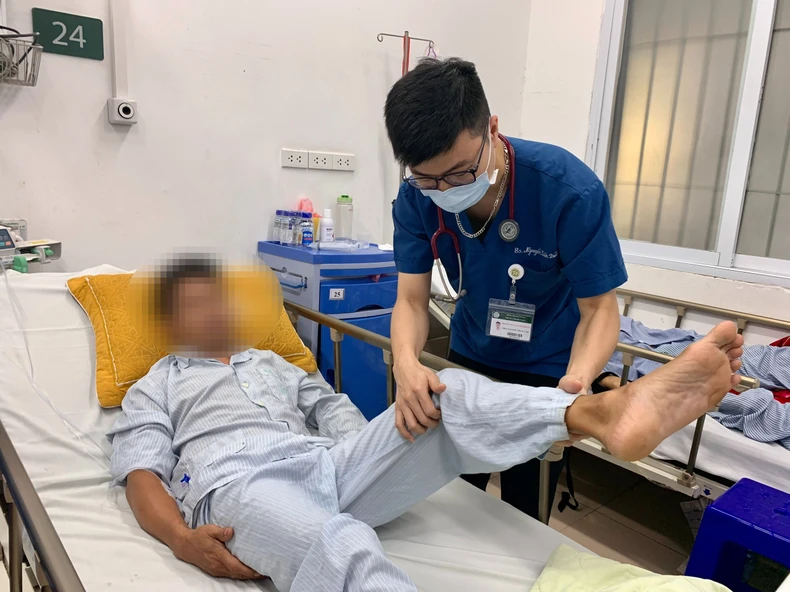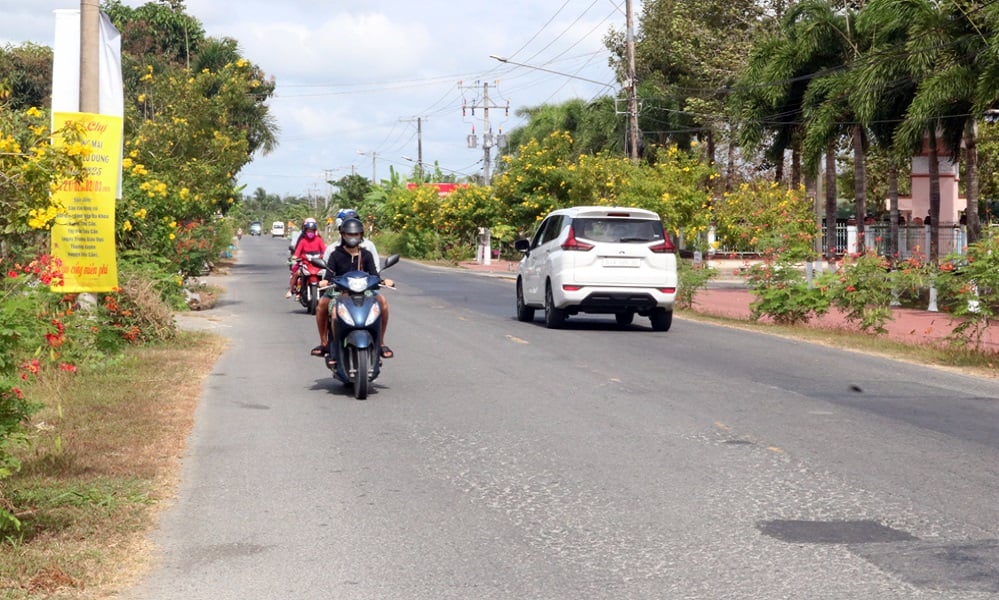The Stroke Center, Bach Mai Hospital, has just received 7 cases of stroke recurrence in the emergency room. Specialist II Doctor Nguyen Tien Dung, Deputy Director of the Stroke Center, Bach Mai Hospital, said that the 7 cases of recurrence just admitted to the emergency room all stopped taking medication, all were more severe than the previous time, including both young and old people. Subsequent strokes are definitely more severe than the previous time.
Lying in a hospital bed with his left side severely paralyzed, Mr. NVT (43 years old, Nghe An) discovered he had high blood pressure at the age of 28, of unknown cause. The patient went to the health station and the district hospital to get medication, but seeing that his blood pressure did not decrease, he stopped using the medication.
His condition worsened due to the medication, including fatigue, dizziness, difficulty speaking, weakness in the right limbs, and blood pressure reaching 230. “The patient was taken to the emergency room with a brain hemorrhage due to high blood pressure and then transferred to our hospital. The patient shared that he was very regretful because he knew he would have to face the possibility of hemiplegia,” said Dr. Dung.
At a very young age, male patient NVT (born in 1993, Ninh Binh) suddenly fell into a state of severe paralysis on the right side of his body due to a cerebral infarction. The patient was treated in the emergency room and intensively treated at the Stroke Center for 10 days, then treated with internal medicine and intensive rehabilitation exercises.
After 1.5 months of treatment, Mr. T. recovered well and was discharged from the hospital. The doctor prescribed medication to take at home and scheduled a follow-up appointment in 1 month. However, the patient subjectively did not return for a follow-up visit and did not take medication to prevent a sudden relapse, causing him to be paralyzed on one side of his body, have a crooked mouth, slurred speech, and was taken to the Stroke Center for emergency care 5 days later.
Specialist II Doctor Nguyen Tien Dung said that the patient had a relapse of cerebral infarction. Unfortunately, this time the patient's paralysis was more severe, with hemiplegia on one side and very poor mobility. The prognosis for recovery was much more difficult than the previous time.
Also admitted to the emergency room for recurrent stroke was Ms. NTH (44 years old, Kim Bang, Ha Nam) with a history of mechanical mitral valve replacement surgery, had a stroke 5 years ago but recovered well. Because of heart disease, she must maintain anticoagulant medication for life and needs to have regular check-ups to adjust the anticoagulant dose.
 |
Specialist II Doctor Nguyen Tien Dung, Deputy Director of Stroke Center, Bach Mai Hospital examines a patient. |
Like Mr. T., Ms. H. was subjective and did not go back for a check-up to adjust the dosage for the past 6 months, but arbitrarily maintained the same prescription as before. As a result, the patient was recently hospitalized for a recurrent cerebral infarction, and the blood clotting index test did not meet the treatment target. The patient's prognosis this time is worse than the previous time.
On average, the Center receives 50-60 severe stroke cases transferred from other hospitals each day, including many patients who are very subjective about their health.
According to this expert, stroke patients after being treated and stabilized are all carefully advised to take medication to prevent recurrence and to follow up with follow-up appointments on schedule. However, many people are subjective about their health, skipping check-ups and forgetting to take medication.
“High blood pressure is the leading risk factor for stroke, but many people are unaware of their blood pressure readings, do not get checked, and do not measure their blood pressure. Some people know they have high blood pressure, but ignore it, causing them to face worse health conditions,” Dr. Dung emphasized.
According to the American Stroke Association, stroke recurrence is preventable and has a very high success rate, with 80% of stroke survivors able to successfully prevent a recurrence.
Therefore, Dr. Dung emphasized that people who have had a stroke must strictly follow the doctor's instructions. People must know how to recognize stroke symptoms, listen to their bodies and remember the signs of a stroke; when they suspect they are having a stroke, they must act quickly and urgently, do not hesitate or waste time, but go to the hospital immediately.
People should measure their blood pressure regularly (including young people) and remember their blood pressure readings like they remember their age to prevent stroke and other complications of high blood pressure such as heart failure, aortic aneurysm and dissection, myocardial infarction, etc.



![[Photo] Overcoming all difficulties, speeding up construction progress of Hoa Binh Hydropower Plant Expansion Project](https://vstatic.vietnam.vn/vietnam/resource/IMAGE/2025/4/12/bff04b551e98484c84d74c8faa3526e0)



![[Photo] Closing of the 11th Conference of the 13th Central Committee of the Communist Party of Vietnam](https://vstatic.vietnam.vn/vietnam/resource/IMAGE/2025/4/12/114b57fe6e9b4814a5ddfacf6dfe5b7f)


















































































Comment (0)